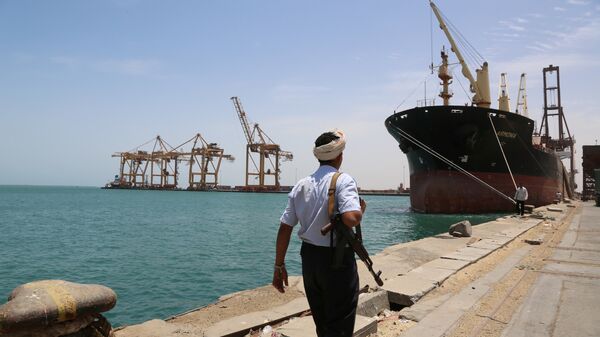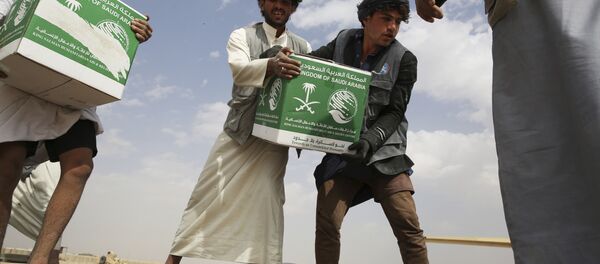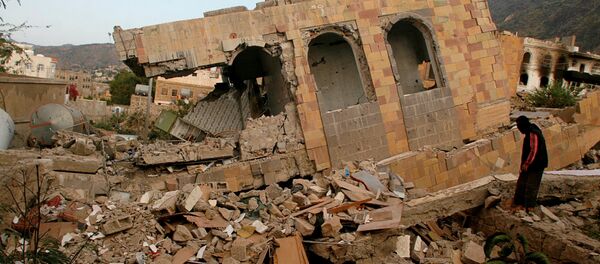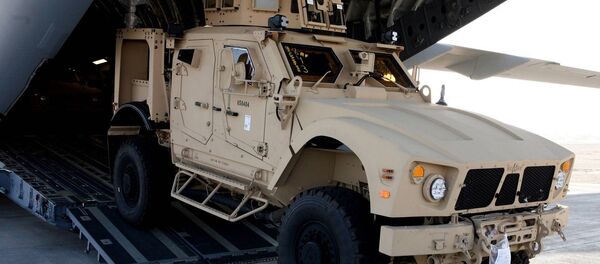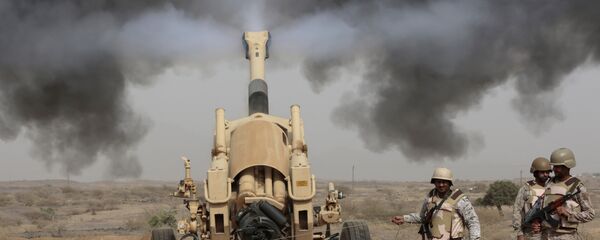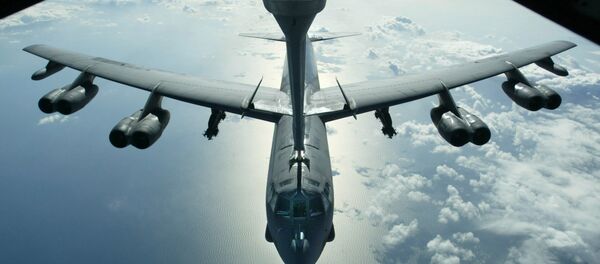Mac Hamilton, executive manager at STAND: The Student-led Movement to End Mass Atrocities, told Radio Sputnik's By Any Means Necessary Tuesday that the aid disruptions came from a recent shift in Houthi tactics that endangered the ceasefire near the key port of Hodeidah.
"Our greatest challenge does not come from the guns, that are yet to fall silent in this conflict," Herve Verhoosel, senior spokesperson for the UN World Food Program, said in a Monday statement. "Instead, it is the obstructive and uncooperative role of some of the Houthi leaders in areas under their control."
"Humanitarian workers in Yemen are being denied access to the hungry, aid convoys have been blocked, and local authorities have interfered with food distribution, and — most importantly, there have been repeated obstacles placed in the way of our independent selection of beneficiaries and a request for a roll out of a biometric registration system," Verhoosel said. "This would allow WFP to identify and target the most hungry and ensure that they are the beneficiaries of food assistance."
Verhoosel noted that negotiations with rebel leaders had not yielded "tangible results," saying, "Some of the Houthi leaders have made positive commitments" that would allow aid to be delivered, but they were "being let down by other Houthi leaders who have broken assurances they gave us on stopping food diversions and finally agreeing to a beneficiary identification and biometric registration exercise."
"If we are not given the access and freedom to decide who gets this vital assistance, then we will have to take the hard decision of implementing a phased suspension of our operations in Houthi controlled areas," the spokesperson said.
"The ultimate responsibility for the welfare of their people lies with the Yemeni leadership," Verhoosel said. "If WFP is allowed to deliver an operation that meets minimum international standards, we are still ready to play our part and to ensure a better future for the millions of Yemenis who are struggling to feed their families."
The Food Security Information Network's 2019 Global Report on Food Crisis, issued last month, warned that Yemen was "the world's gravest food insecurity crisis," with 53% of the country "in urgent need of food and livelihood assistance." That's almost 16 million people. Another 30% of the population, or 8.9 million Yemenis, were described by the report as "stressed," meaning they have only the most minimally adequate food access.
"Weeks ago, it looked like it was 1% of aid being diverted by Houthi forces, and now it may be a much larger figure than that," Hamilton told Sputnik Tuesday.
"What we've seen is that, largely since the November talks, a lot of the ceasefires have been holding until very recently, and I think that is a result of, when peace talks do happen, each side is trying to have the upper hand when there are upcoming peace talks," Hamilton noted. "So, they might escalate on the battlefield in order to have a stronger negotiating position at the table, and that's something that we've seen many times throughout this conflict on both the Saudi-and-UAE side and on the Houthi side as well."
On May 14, Houthi forces partially executed an agreement to redeploy away from three strategic ports, including Hodeidah, in accordance with a peace agreement reached last year. However, on the 18th, Hamzah Alkamaly, the Yemeni deputy minister for youth and sports, blasted the Houthi move as "fake" and UN Special Envoy for Yemen Martin Griffiths as "not balanced anymore" and taking the side of the Houthis, Sputnik reported.
"Since November, we largely had seen that Houthis were avoiding attacking cities and infrastructure and had kind of continued border attacks on Saudi and left it at that, but that has been changing in Hodeidah Province in the past week or so," Hamilton said, noting, "That's really on both sides. After the Houthis hit two oil targets in Saudi last week, that's when we saw the ceasefire in Hodeidah really trembling."
The port of Hodeidah is the country's primary port of entry for aid.
Hamilton said there were several moves being taken by US national lawmakers seeking to limit arms sales to participants in the war in Yemen. However, US President Donald Trump vetoed a resolution last month to end US involvement in the war, calling it an "unnecessary, dangerous attempt to weaken my constitutional authorities, endangering the lives of American citizens and brave service members, both today and in the future."
Hamilton said there's a warning in Yemen for other conflicts: "the longer that peace negotiations stall, the longer that that conflict continues, the more entrenched people's views are, and I think the less likely there is to be a really lasting peace."
"It's my hope that we're able to make some progress and really use some US and international community leverage to work towards a standing peace in Yemen," she said.
Yemen's Minister of Public Health and Population Taha Al-Mutwakel said on Friday that at least 425 medical centers had been targeted by the Saudi-led coalition since the civil war began in Yemen, Sputnik reported.
The war began in March 2015, when Yemeni President Abdrabuh Mansour Hadi was driven out of Sana'a by Ansar Allah, a Zaidi Shiite army better known as the Houthi movement. Zaidis form roughly one-third of the Yemeni population, and the Houthis say they are fighting against the influence of Saudi Arabia and Sunni Salafist influences coming from it. Indeed, when Hadi was forced to leave office, he fled to Riyadh, and Saudi Arabia, along with allies such as the United Arab Emirates and Sudan, began a bombing campaign against the Houthis and started providing support to allied militias in the country.
However, as Sputnik has reported, those militias often include groups like al-Qaeda in the Arabian Peninsula (AQAP), and the equipment being funnelled to them is often of Western manufacture.
According to the UN Office of the High Commissioner for Human Rights (OHCHR), at least 7,072 civilians were killed and 11,205 wounded by US-made weapons between the war's inception in March 2015 and March 2019. However, UNICEF (United Nations Children's Fund) Executive Director Henrietta Fore told the UN Security Council last week that at least 7,300 Yemeni children alone had been killed since the start of the war, and the Associated Press has estimated that the conflict as a whole has claimed the lives of at least 57,538 people since January 2016. That number could increase by tens of thousands more once death totals from 2015 are taken into account.
